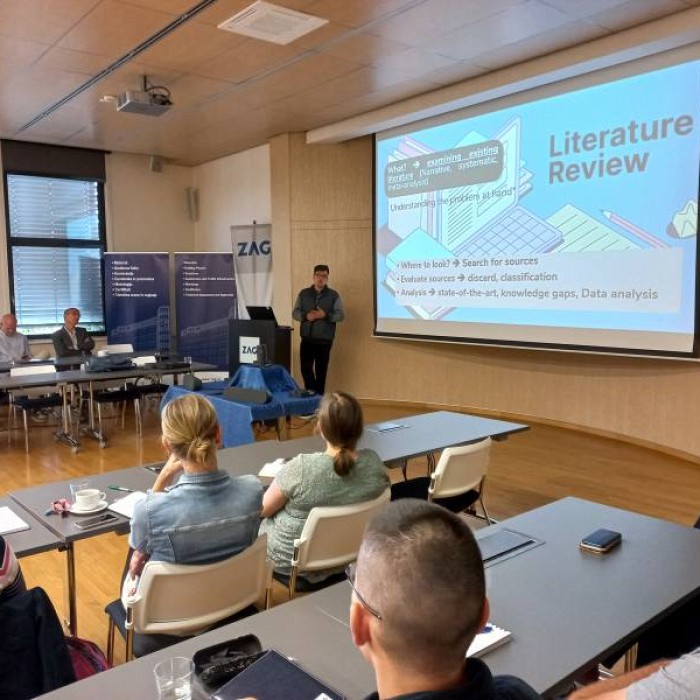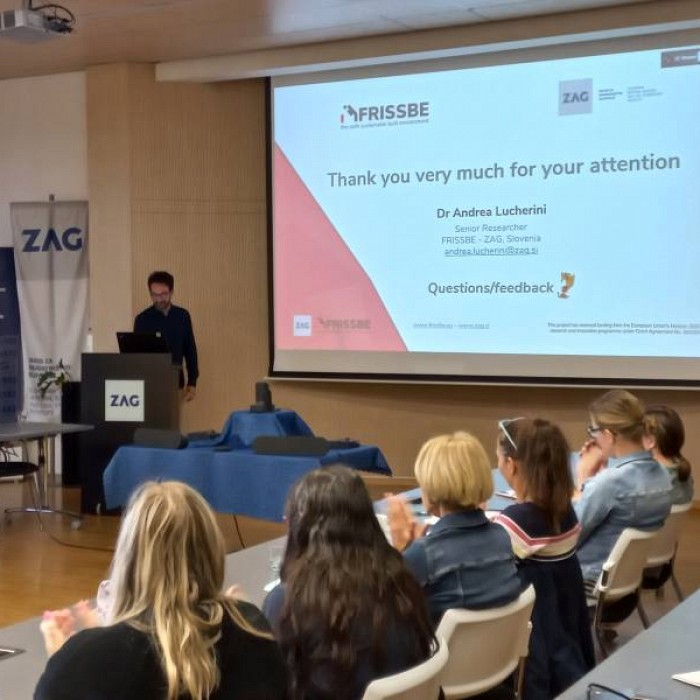News
Internal workshop on research career, funding, and publishing offered for young researchers
FRISSBE hosted an Internal workshop for young researchers with topics ranging from research, career planning, funding, supervision, publishing, editor’s job in a journal, and other related topics. The event consisted of presentations from world-leading experts and high-level professionals in fire safety and academia. Thus, recognized Professors José Torero, Bart Merci, and Grunde Jomaas along with Dr Andrea Lucherini and Dr Ulises Rojas-Alva shared insightful information and inspirational stories related to the research field and academia. Almost 50 ZAG employees, including the director Dr Aleš Žnidarič, attended the event. Interest in participation was also among not-so-young researchers and the organizers welcomed everyone gladly.
After the director welcomed everyone with some introductory sentences, Professor Torero was off to a great start speaking about the positive aspects and benefits of the globalization of research and international collaboration. He discussed how several opportunities and support can stem from the evident networking possibilities one can obtain from international collaboration. Thus, these opportunities and support can translate into major outcomes such as funding for projects, promotion and broadening of research, support for new researchers, etc. Moreover, he stressed the relevance of empathy as a major factor in international collaboration to occur. It is important to understand and have respect for the work that each side of the collaboration is carrying out and the relationship must be beneficial for both sides.
From his side, Professor Bart Merci gave insights regarding the role of a journal editor, shared his experience as the editor-in-chief of the “Fire Safety Journal”, and provided advice on the “dos and don´ts” when it comes to the submission of research papers for publication in journals. Professor Merci explained that fully understanding what is the problem one wants to solve, the methods one needs to follow to find an answer to such a problem, and the novelty the work represents are key to conducting fruitful research. Likewise, in terms of reporting it is important to clearly portray such factors in the abstract of the research and reinforce them in the conclusions along with the findings. These two sections might be the first things anyone would review and therefore they might get the reader engaged or repelled. Moreover, he recommended to the audience choose wisely regarding the journals they could be aiming to publish in. He stressed the importance of considering the crowd to which the researchers want to reach over the “impact factor” a specific journal might have. Considering the former would translate in a greater impact compared to the latter.
Last one before the break, Dr Andrea Lucherini addressed common issues that PhD students and early-career researchers often face while conducting research and motivated self-assessment of the audience on productivity matters throughout his presentation. He recommended the book “Seven Secrets of Highly Successful Research Students” as a great tool to improve skills as a researcher and also to better manage important aspects like work-life balance. In fact, he discussed how doing a PhD and carrying out research is indeed a job that requires several qualities from the researcher. According to the poll among the audience, the main qualities are creativity, discipline, and communication. He also addressed important concepts involved in the research-conducting process such as the “displacement activities” or the “golden hours”. The former are the activities that one does to feel less guilty while not being productive such as checking and replying to emails, formatting the written texts; and the latter being the effective productive time during which one is actually conducting research i.e., writing and analyzing results.
After a round of coffee and cookies, Professor Grunde Jomaas gave a presentation on the benefits of online presence addressing platforms such as Google Scholar, LinkedIn, X (ex-Twitter), etc. and provided some tips and tricks on how to get the most out of them. He shared how his role as the ERA Chair holder in the FRISSBE project came with this opportunity to grow in such dimensions and take advantage of the online platforms and possibilities to make the project more visible and recognized. He addressed the importance of considering the rules of online platforms to maximize the impact and benefits of online presence. For instance, he discussed the essential times, format, and content matters one should consider to maximize the impact of online presence on LinkedIn and other platforms. He also stressed the fact that online presence and visibility both at the company and personal levels might and can translate into benefits such as invitations to seminars and keynotes, growing network, research collaborations, business proposals, but also new customers and clients. Thus, he expressed the importance of researchers having a presence in Google Scholar and other online platforms.
Lastly, Dr Ulises Rojas-Alva touched on Research planning and ways in which information can be classified with the use of schematics to allow for better problem identification and experimental execution during research. He addressed the importance of considering that a problem is always multi-disciplinary and the breakdown of it into its multiple dimensions is key to understanding how to tackle the problem from a specific direction. Moreover, he stressed the fact that one must make sure that the resources being used can be validated and verified. For instance, the employment of models that aim to characterize or represent reality should be checked with respect to these matters when conducting research.
As usual, the event also lent spaces for the attendees to bond over the coffee and lunch breaks aiming to strengthen work relationships and increase their networking and collaboration opportunities.
Overall, the workshop proved to be successful since the attendees benefitted from gaining information and knowledge regarding the world of academia by firsthand and the promotion of research under the framework of the FRISSBE project was accomplished. We are very much looking forward to hosting events like these in the future, as they are important in strengthening the research capacities of the whole ZAG.




